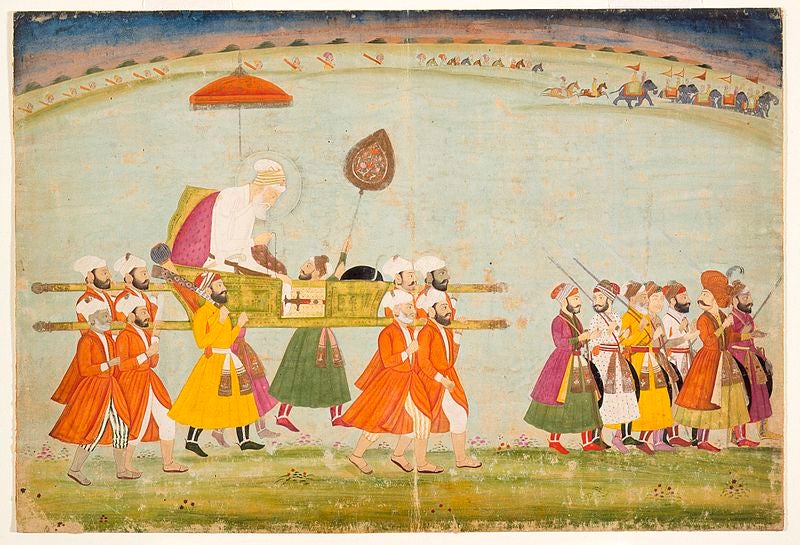T.C.A. Raghavan’s latest book takes us to a time when history hadn’t lost its innocence, and its eminent purveyors were not obsessed with ideological and political correctness.
In July 1954, Rajendra Prasad, the first President of India, forwarded to then Prime Minister Jawaharlal Nehru a recommendation that Sir Jadunath Sarkar be awarded the Padma Vibhushan — independent India’s second highest civilian award. The recommendation had originally come from the then governor
Why was this distinguished historian treated so disdainfully? T.C.A. Raghavan, in History Men: Jadunath Sarkar, G.S. Sardesai, Raghubir Sinh and Their Quest for India’s Past, explains the reasons when he writes, “At a time when being politically correct in writing academic history was gaining in portance, Sarkar’s assessment of and emphasis on Aurangzeb’s orthodoxy was viewed by many as divisive and negative.” The author quotes historian A.L. Srivastava to further bolster his claim. “The so-called Allahabad school of medieval Indian history, torn between ‘academic rectitude’ and ‘civic duty’, blames Jadunath for not omitting offensive details of temple destruction and putting down of Hinduism by force from his works. It feels that the mere mention of such facts of history is repugnant to Muslim feelings and drives a wedge between the two communities,” Srivastava is quoted as saying.
It is this newfound sense of political correctness and ideological obsession that turned a giant of a historian into the “high priest of communal historiography in India”, as D.N. Jha, an eminent historian himself, derisively describes Sarkar. But was Sarkar’s historiography communal? Did he selectively paint a particular community in darker shades? Far from it, as Raghavan suggests. If Sarkar’s work on Aurangzeb made him a “communal” historian among certain Left-liberal and secular sections, his less than charitable portrait of Shivaji, who appears in his books as merely “Shiva”, had upset several Hindu elements, especially in Maharashtra.
The fact is Sarkar wrote what he thought was right. In a speech in 1915, he said matter-of-factly, “I would not care whether truth is pleasant or unpleasant, and in consonance with or opposed to current views. I would not mind in the least whether truth is or not a blow to the glory of my country.” Even a year before his death in 1958, he wrote a letter to Rajendra Prasad, saying: “National history must be comprehensive, true, accurate and impartial… It will be national not in the sense that it will try to suppress or whitewash everything in our country’s past that is disgraceful, but because it will admit them and at the same time point out that there were also other and nobler aspects in the stages of our nation’s evolution.”

Since the 1920s, and more so after Independence, historical accuracy took a backseat to political and ideological correctness. Truth was the first and foremost casualty as history became a tool to build nation and create social and communal amity, howsoever illusory they might be. So, in the name of secularism and communal bonhomie, it became pertinent to gloss over the heinous deeds of, say, Aurangzeb, and worse, selectively pull out sporadic acts of barbarism from the other side to balance things out. Unfortunately, Sarkar was both alien to — and uncomfortable with — this kind of historiography. For him, the craft of history wasn’t merely an arduous intellectual exercise to look at the past but a relentless search for the truth. And truth should never be a hostage to prevailing national sensibilities, political correctness and the need for communal parity.
The soul of the book, however, is the friendship Sarkar shared with Sardesai and Raghubir Sinh, and their unrelenting commitment as historians to truthfully dig the past out. It all began with Sarkar getting a suggestion to explore Maratha sources to further enrich his Mughal historiography, thus taking him to Sardesai, an expert on the subject. This turned out to be a mutually beneficial collaboration, with Sarkar having an access to Maratha documents and Sardesai getting hold of Mughal and Persian sources. History, especially of the late 17th, 18th and 19th centuries, got richer and better in the process. As for Sinh, heir to a princely state in central India, he became Sarkar’s student in the 1920s and through him came closer to Sardesai. Sinh, on his part, wrote extensively on Rajput history, the most lasting being his work on Malwa.
The three men held each other in high esteem, but this did not mean they never had disagreements. Sarkar, for instance, would find Sardesai too sympathetic towards the Marathas, while Sardesai thought the former mostly saw things from the Mughal/Persian perspective. Similarly, Sinh’s take on the role of the Marathas in Malwa stood in sharp contrast to that of Sardesai’s. But these differences never came in the way of respect the three had for each other. Sinh and Sardesai, for instance, came to the rescue of Sarkar when the latter’s manuscript on the history of Jaipur found no takers. The Rajasthan royalty wasn’t interested in a book on the Maratha domination of Jaipur. It was only in the 1980s that the book was posthumously published, that too because of Sinh’s efforts. Sardesai too played his part as a mother-in-law of the Jaipur ruler was his student!
Raghavan’s History Men is one rare book which, without taking any ideological position, tells us about a time when history hadn’t lost its innocence. Sarkar, in that sense, was probably the last of the great historians who didn’t hold history a hostage to any ideological and political correctness. The eminent ones who are crying hoarse today, bemoaning the distortion of history, stand accused of a similar crime when the dispensation was favourably disposed to them. The book is a stark reminder to that.

